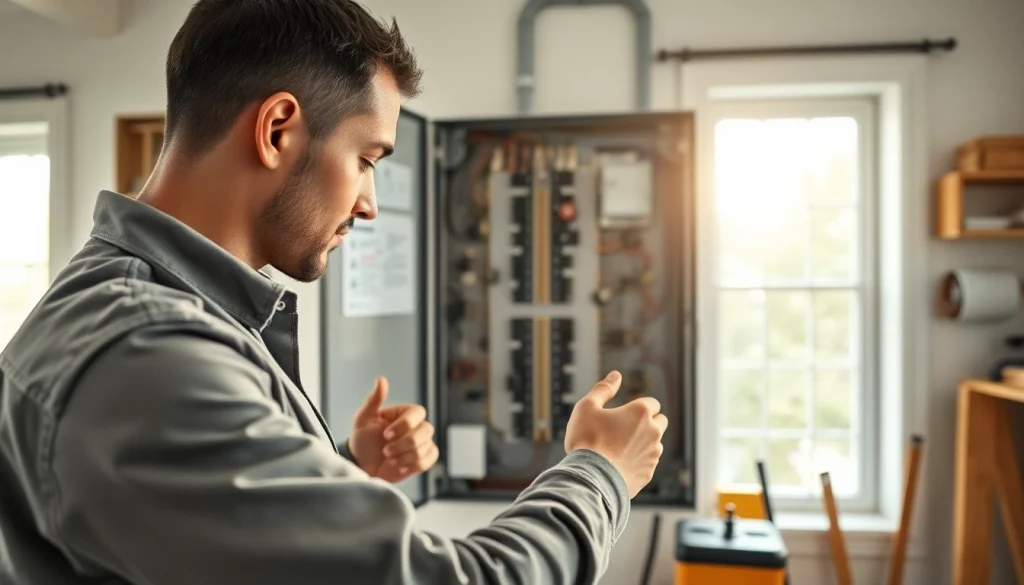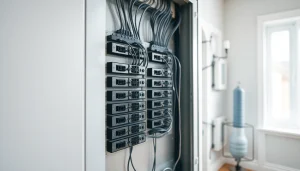
Understanding the Basics of Electrical Panel Upgrade
What Is an Electrical Panel?
An electrical panel, often referred to as a breaker box or fuse box, is a crucial component of a home’s electrical system. It acts as a central hub where electricity from the utility company enters your home and is distributed to various circuits throughout your property. The panel houses circuit breakers, which are safety devices designed to protect your electrical system from overloads and short circuits. Understanding the fundamental role of your electrical panel is essential for determining whether an upgrade is necessary.
The Functions of an Electrical Panel
The electrical panel serves several functions that are vital to the safe and efficient operation of your home’s electrical system:
- Distribution of Electrical Power: The panel distributes power to different circuits, each assigned to specific areas or appliances in your home.
- Protection: Circuit breakers within the panel automatically shut off power to circuits that experience overloads or faults, preventing potential fire hazards.
- Control: The panel allows homeowners to easily shut off power to individual circuits as needed for maintenance or safety.
- Monitoring: Many modern panels come with smart technology that enables homeowners to monitor their energy usage and detect issues remotely.
Signs You Need an Electrical Panel Upgrade
Recognizing the signs that your electrical panel may need an upgrade is essential for maintaining the safety and functionality of your electrical system. Some indicators include:
- Frequent Circuit Breaker Trips: If you find yourself resetting breakers regularly, your panel may not be equipped to handle your electrical demands.
- Flickering or Dimming Lights: This can indicate insufficient power supply to circuits, often a sign of an outdated panel.
- Burning Smells or Visible Damage: Any burning smells, smoke, or signs of corrosion around the panel should prompt immediate inspection.
- Old Amperage Ratings: If your panel is rated below 200 amperes and your household has increased its electrical usage — such as adding new appliances or circuitry — an upgrade may be necessary.
- Installation of High-Power Appliances: New equipment, like electric cars or large HVAC systems, may require an upgraded electrical capacity.
Benefits of an Electrical Panel Upgrade
Increased Capacity for Modern Appliances
One of the primary benefits of upgrading an electrical panel is the increased capacity to support modern electrical appliances. Current homes are often equipped with numerous devices and systems that require considerable power, including:
- High-efficiency HVAC systems
- Electric vehicle (EV) chargers
- Smart home devices
- Home office technology
Upgrading to a higher amperage panel allows homeowners to safely utilize these modern conveniences without risking electrical overload, ensuring that all devices function optimally.
Enhanced Safety Features
Electrical safety is paramount in any home. An upgraded electrical panel often includes advanced safety features that older models lack. These enhancements may include:
- Arc-fault circuit interrupters (AFCIs), which help prevent electrical fires caused by arcing faults.
- Ground fault circuit interrupters (GFCIs) to protect against electrocution, especially in wet areas like kitchens and bathrooms.
- Surge protection features to safeguard against voltage spikes that can damage sensitive equipment.
These safety features not only protect your home but also provide peace of mind for homeowners and their families.
Potential Cost Savings on Energy Bills
An upgrade to a more efficient electrical panel can lead to significant cost savings on energy bills. With an upgraded panel, you can take advantage of energy-efficient appliances that may require a higher initial investment. However, their lower energy consumption can quickly offset those costs. Moreover, modern panels often facilitate more effective energy management, allowing homeowners to monitor and optimize their usage patterns.
Cost Factors Involved in an Electrical Panel Upgrade
Average Costs for Upgrading
The cost of an electrical panel upgrade can vary greatly depending on several factors, including the location, labor costs, and the specifics of the installation. On average, homeowners can expect to pay anywhere from $800 to $4,000 for a panel upgrade. This price typically covers the panel itself and labor costs but may not include any necessary upgrades to wiring or other electrical components.
Variations Based on Electrical Work Complexity
Not all installations are created equal; the complexity of your electrical system can influence the cost of your upgrade. Homes with outdated wiring or those requiring extensive repairs may incur higher costs. Additionally, logistical factors such as the panel’s location and accessibility can also affect labor expenses. An experienced electrician can provide an estimate that reflects the specific requirements of your home.
Potential Rebates and Tax Credits
Many homeowners may be eligible for rebates and tax credits associated with energy efficiency upgrades, including electrical panel replacements. Depending on various local and federal incentives, these financial benefits can significantly reduce the overall cost of an upgrade. Homeowners should research available programs in their area and consult with their local utility company for guidance on incentives that may apply.
Steps to Prepare for an Electrical Panel Upgrade
Initial Assessments by Qualified Professionals
Before proceeding with an electrical panel upgrade, it’s crucial to have a thorough assessment conducted by a licensed electrician. This professional evaluation will help identify the specific needs of your electrical system, ensuring that the upgrade aligns with your home’s requirements. The electrician will check:
- Current electrical load and usage patterns
- Overall condition of the existing wiring
- Location and capacity of existing electrical service
Understanding Local Code Requirements
Electrical installations must comply with local, state, and national safety codes. Familiarizing yourself with these regulations is essential before commencing an upgrade. Your electrician will typically handle this aspect, but as a homeowner, you should be aware of the requirements to ensure your upgrade is compliant. An installation that meets code not only enhances safety but also protects against potential future legal issues.
Choosing the Right Panel for Your Needs
When selecting a new electrical panel, it’s important to consider your current and future power needs. Factors to evaluate include:
- Amperage Rating: Most modern homes benefit from panels with a minimum rating of 200 amps.
- Smart Features: Consider whether you want a panel that allows for smart home integration and monitoring.
- Space and Configuration: Assess the available space in your home for installation and choose a configuration that optimally utilizes that space.
After the Electrical Panel Upgrade: What to Expect
Post-Upgrade Safety Checks
After the upgrade is completed, it’s crucial to have a series of safety checks performed. This ensures that the new panel and any associated wiring function correctly and safely. Safety measures can include:
- Testing circuit breakers for responsiveness
- Inspecting for proper connections and securing all wiring
- Verifying compliance with local codes and regulations
Improving Home Efficiency
Once the upgrade is complete, homeowners can immediately start enjoying improved efficiency. This includes the effective operation of appliances, reduced risk of overloads, and the potential for lower energy bills. Properly functioning electrical panels enable homes to better handle modern energy demands, paving the way for installations of energy-efficient systems and products.
Long-term Maintenance and Considerations
To ensure the longevity and reliability of your upgraded electrical panel, regular maintenance is key. Homeowners are advised to schedule periodic inspections every few years to identify any potential issues before they become major problems. Furthermore, familiarize yourself with the panel’s operation to handle small issues efficiently, such as resetting breakers when necessary.
In conclusion, recognizing the signs suggesting the need for an Electrical Panel Upgrade and understanding the associated benefits can empower homeowners to take proactive steps in ensuring their home’s electrical safety and efficiency. The importance of this upgrade cannot be overstated, as it plays a critical role in the overall performance and safety of your home’s electrical system.






